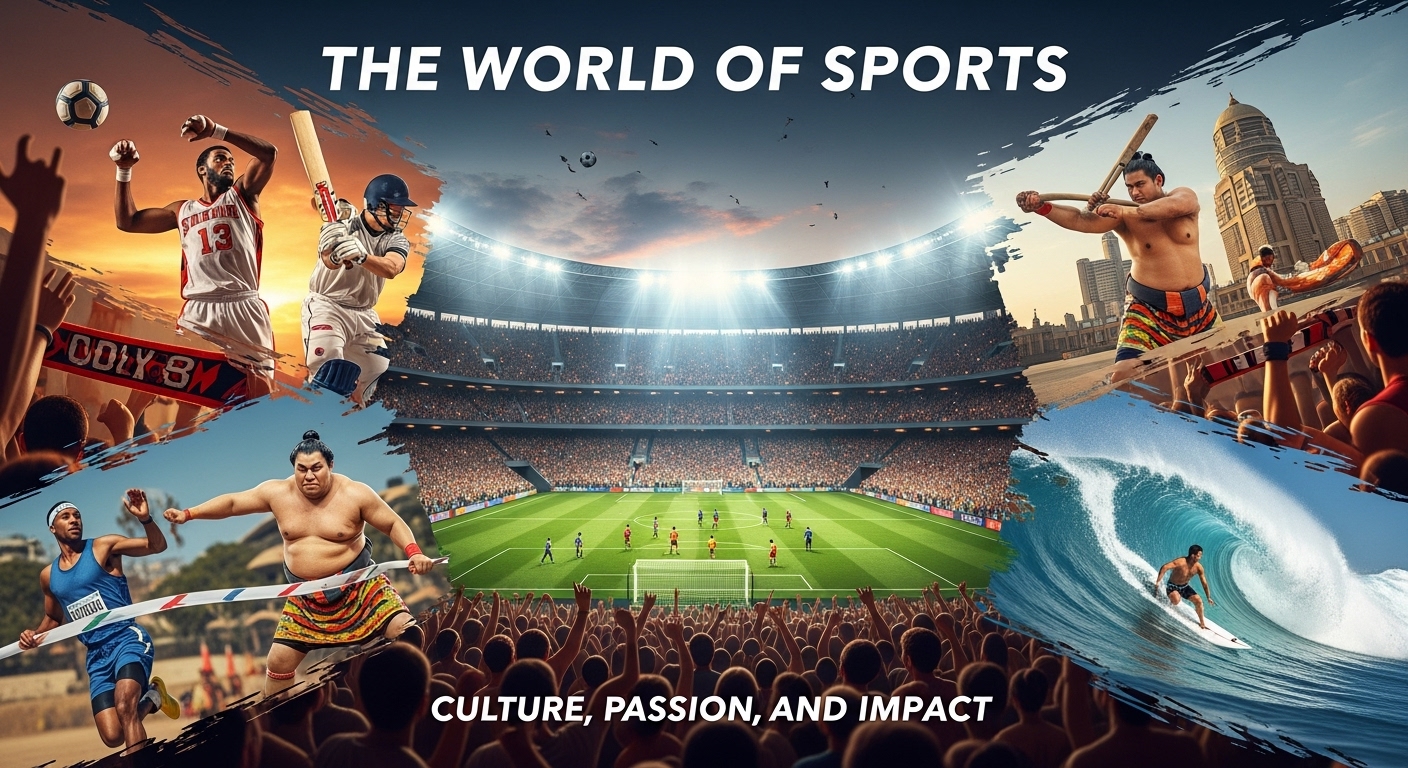Sports have been an integral part of human civilization for centuries. They bring communities together, promote physical and mental well-being, and inspire individuals to push beyond their limits. From ancient athletic competitions to modern-day professional leagues, sports have evolved into a diverse and dynamic world that continues to captivate people across the globe.
The History of Sports
The history of sports dates back thousands of years. Ancient civilizations recognized the value of physical activity and competition, often linking sports with cultural and religious practices.
Ancient Sports
In Ancient Greece, sports were not merely a form of entertainment but also a demonstration of physical excellence and honor. The Olympic Games, first recorded in 776 BCE, were a significant cultural event, featuring competitions such as running, wrestling, and discus throw.
Similarly, in ancient China, sports such as archery, wrestling, and chariot racing were highly regarded. Martial arts, including kung fu and tai chi, were developed not only for self-defense but also as a way to maintain physical fitness and spiritual balance.
In ancient Rome, gladiatorial games and chariot races were immensely popular. These events showcased strength, strategy, and endurance, often attracting large audiences and serving as a platform for political and social influence.
Medieval and Renaissance Sports
During the medieval period, sports often revolved around military training and social gatherings. Jousting, archery competitions, and hunting were common among the nobility, while commoners enjoyed games such as football, hurling, and wrestling.
The Renaissance period saw a revival of interest in classical sports, emphasizing athletic skill, discipline, and sportsmanship. Fencing, tennis, and horse riding gained popularity, setting the foundation for modern competitive sports.
Types of Sports
Sports can be broadly classified into several categories based on their nature, rules, and physical demands.
Team Sports
Team sports involve groups of players working together to achieve a common objective. Examples include football, basketball, cricket, and volleyball. Team sports emphasize coordination, strategy, communication, and collective effort. They teach participants the importance of collaboration and mutual support.
Individual Sports
Individual sports focus on personal performance, often highlighting skill, endurance, and mental toughness. Examples include tennis, swimming, athletics, and gymnastics. Individual sports allow athletes to set personal goals, measure progress, and experience self-mastery.
Combat and Martial Arts
Combat sports and martial arts include boxing, wrestling, judo, karate, and mixed martial arts. These disciplines require discipline, agility, strength, and tactical thinking. Practicing martial arts also enhances mental focus, self-confidence, and resilience.
Adventure and Extreme Sports
Adventure sports, such as rock climbing, skydiving, surfing, and mountain biking, appeal to those seeking adrenaline and excitement. Extreme sports challenge physical limits, build courage, and foster a deep connection with nature.
Recreational and Casual Sports
Recreational sports include activities like jogging, swimming, cycling, and yoga. These are primarily aimed at promoting health, relaxation, and social interaction rather than professional competition. Recreational sports are accessible, enjoyable, and beneficial for people of all ages.
The Importance of Sports
Sports offer far more than just entertainment. They play a crucial role in physical, mental, and social well-being.
Physical Benefits
Engaging in sports improves cardiovascular health, builds muscle strength, enhances flexibility, and boosts overall stamina. Regular participation in sports reduces the risk of chronic diseases, such as obesity, diabetes, and heart conditions. It also strengthens bones, improves coordination, and enhances immune system function.
Mental and Emotional Benefits
Sports have a profound impact on mental health. Physical activity triggers the release of endorphins, chemicals that promote happiness and reduce stress. Sports also improve concentration, memory, and problem-solving skills.
Participation in sports fosters resilience, discipline, and self-confidence. It teaches athletes how to cope with failure, handle pressure, and set realistic goals. Team sports, in particular, encourage empathy, leadership, and effective communication.
Social and Cultural Benefits
Sports bring people together and foster a sense of community. They break down social barriers, promote inclusivity, and encourage teamwork. Sporting events, whether local matches or global tournaments, unite fans and athletes from diverse backgrounds.
Sports also reflect cultural identity and national pride. Major events like the Olympics, FIFA World Cup, and Wimbledon showcase talent, tradition, and the spirit of competition on a global stage.
Modern Sports and Technology
Technology has transformed the world of sports, enhancing performance, training, and fan engagement.
Wearable Technology and Analytics
Athletes now rely on wearable devices to monitor heart rate, track movement, and analyze performance metrics. Sports analytics help coaches and players optimize strategies, prevent injuries, and make informed decisions during games.
Virtual Reality and Simulation
Virtual reality (VR) allows athletes to practice in simulated environments, improving skills and reactions. VR is also used to create immersive fan experiences, enabling audiences to feel like they are part of the action.
Social Media and Broadcasting
Social media platforms have revolutionized the way sports are consumed and discussed. Fans can follow their favorite athletes, share highlights, and engage in real-time discussions. Advanced broadcasting technologies provide multiple camera angles, slow-motion replays, and interactive experiences, making sports more accessible and engaging.
Popular Sports Around the World
Different regions have their own preferred sports, influenced by culture, history, and climate.
Football (Soccer)
Football, known as soccer in some countries, is the world’s most popular sport. It is played in nearly every nation and has a massive global fanbase. Football promotes teamwork, endurance, and strategic thinking. Famous leagues include the English Premier League, La Liga, and Serie A.
Basketball
Basketball is a fast-paced, high-energy sport enjoyed globally. It requires agility, coordination, and precise teamwork. The NBA remains the pinnacle of professional basketball, producing iconic athletes and memorable moments.
Cricket
Cricket holds immense popularity in countries like India, Australia, England, and Pakistan. It is a sport of skill, patience, and strategy, with formats ranging from quick-paced Twenty20 matches to traditional Test matches.
Tennis
Tennis is a sport that combines agility, endurance, and mental toughness. Grand Slam tournaments like Wimbledon, the US Open, and the French Open showcase the highest level of competition in the sport.
Other Sports
Sports such as athletics, swimming, rugby, golf, and martial arts also have significant global followings. Each sport contributes uniquely to physical fitness, personal development, and cultural appreciation.
Sports and Youth Development
Sports play a pivotal role in shaping young minds and bodies. Participation in sports instills discipline, teamwork, and leadership skills. It encourages healthy lifestyles, boosts academic performance, and provides a constructive outlet for energy and emotions.
Youth sports programs also foster inclusivity and social cohesion, ensuring that children from diverse backgrounds can interact, cooperate, and grow together. They create pathways for talent identification, professional careers, and lifelong passion for physical activity.
Challenges in Modern Sports
Despite the numerous benefits, sports face several challenges in the modern era.
Doping and Fair Play
The use of performance-enhancing drugs undermines the integrity of sports. Strict anti-doping regulations, regular testing, and education programs are essential to maintain fairness and athlete health.
Commercialization and Pressure
The commercialization of sports has introduced intense pressure on athletes to perform and achieve financial success. This can lead to mental health issues, burnout, and ethical compromises. Balancing commercial interests with athlete welfare is crucial.
Accessibility and Inequality
Not all communities have equal access to sports facilities and training. Economic, gender, and social barriers can prevent individuals from participating. Promoting inclusivity, affordable programs, and grassroots initiatives is essential for fostering universal sports engagement.
Injuries and Safety
Sports-related injuries are common, especially in high-contact and extreme sports. Advancements in medical science, protective gear, and training protocols help reduce risks, but awareness and proper guidance remain vital.
The Future of Sports
The future of sports is likely to be shaped by innovation, inclusivity, and sustainability. Emerging technologies, such as artificial intelligence, data analytics, and virtual experiences, will redefine training, strategy, and fan engagement.
Environmental sustainability is becoming a priority, with sports organizations adopting eco-friendly practices, reducing waste, and promoting green stadiums.
Sports will continue to be a platform for social change, inclusivity, and global unity. The combination of tradition, innovation, and human spirit ensures that sports will remain an enduring and inspiring aspect of society.
Conclusion
Sports are far more than just games or competitions. They are a reflection of human potential, creativity, and resilience. From ancient civilizations to modern arenas, sports continue to inspire, challenge, and unite people across the globe.
Participating in sports enhances physical fitness, mental well-being, and social development. It teaches values such as teamwork, discipline, perseverance, and respect. As technology, culture, and society evolve, sports will remain a powerful medium to celebrate achievement, connect communities, and nurture the human spirit.
In essence, sports are not just about winning or losing; they are about striving for excellence, embracing challenges, and enjoying the journey. Whether as a player, spectator, or enthusiast, sports have the power to enrich lives, shape character, and create unforgettable experiences.



